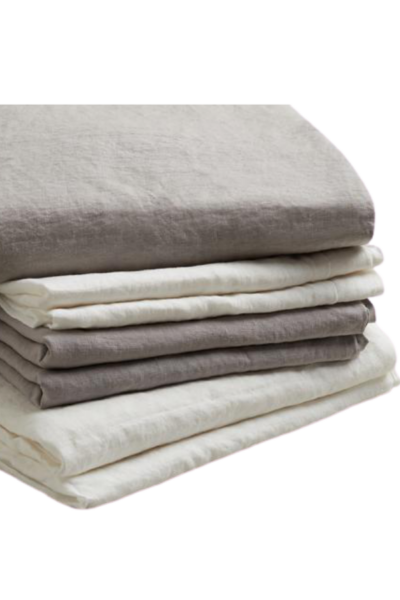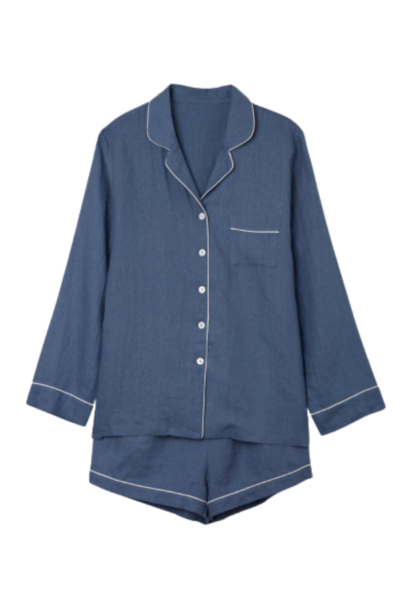In 2017, Jessica Mason wanted to start a company but wasn’t sure what to sell. While she had always been interested in interiors and home goods, finding a product that had healthy margins, low returns, and, in the e-commerce era, would be easy to store and ship took longer to work out. After running the numbers, Mason decided that timeless, sustainable linen bedding checked all of her boxes. “It was helpful to know, especially when you’re starting out and you don’t know how quickly things are going to sell, that [linen] is not seasonal or going to perish,” she explains. Mason named her company Piglet—a nod to the rural British countryside, where the company is headquartered—and began researching how to source her product. “France and Belgium produce the vast majority of the high-quality, sustainable linen on the market, so it was clear to me that the raw material must come from there.”
Less clear to her, however, was deciding on a factory. Although Mason would have preferred, for environmental reasons, to manufacture closer to home, she recognized that she could not keep her price point accessible unless she manufactured abroad. Working with premium mills in Ireland proved to be more than twice as expensive, and the more cost-effective solutions in Spain and Portugal were still 50 percent more expensive than Asian alternatives. In China, everything across the value chain was less expensive: the cost of living is 40 percent lower than in Europe, which means that the cost of labor is cheaper. The scale at which the factories are operating at is much bigger than factories closer to Europe, so they are able to operate with smaller margins and are subsequently in a better position to negotiate lower costs on the raw materials. “We were able to find factories that we really loved in China. The quality was exceptional and the delivery of the work was extremely reliable.”
To finance Piglet, Mason relied on her savings. A five-year work stint in Dubai allowed her to save up enough cash to start with a $25,000 (£20,000) investment, which she put into buying linen and manufacturing it into bedding. Linens are pricey, so she kept her stock as small as she could get away with. It was the easiest way for her to test the market while investing in her hunch—that stonewashed linens would take off as a trend. (Spoiler: she was right.) Waiting for her first batch of inventory to ship, she photographed samples, launched the website, and started building an online community on social media. A few sales trickled in as pre-orders. “It was only about a dozen but that felt huge at the time!” Mason recalls. She figured out the kinks, like how to import her goods, on the fly while customers waited for their orders.
I've built a company that's worth a decent amount, but personally, I've seen very little of that.
There were some early mistakes. Piglet wasn’t even Mason’s first attempt at a small business. She had started another company—selling design-oriented travel accessories, such as travel soaps, blankets, and eye masks—beforehand, into which she had invested $6,200 (£5,000). Mason had been pursuing the idea for around six months before realizing that the demand for the products was a lot smaller than anticipated and the company was taking longer than it should have to get off the ground. She reveals that her big mistake was not spending the time to understand the market size and warns of the difficulties of starting a new business that sells lower-priced products. “If you’re selling a $15 soap and you sell 10 of them, you’re really not making enough money to start building any momentum. For those lower value products, you have to build a pretty big business before you start seeing a real return.” But making those mistakes helped her learn what not to do the next time around. “I would have been happy to have had that cash at the beginning [of Piglet]. But those are the mistakes that you [build your company] on, and I’m really grateful that I could realize those mistakes super quickly.”
Piglet’s first sale came from Instagram, which continues to be one of the company’s strongest retail channels, but Mason also received marketing help from a friend who worked at Facebook. “He was able to allocate his monthly allowance from Facebook for ad campaigns to me, which was very helpful.” Even with that help, Mason knew that the company’s strong revenues would, on their own, allow the company to grow at a quick clip. In just a few months, Piglet was profitable.
Shop Piglet
When it came time to purchase another round of inventory, Mason received help in the form of a loan from her parents, financing 50 percent of the order. “By that time I had proven that there was a market for the products I was selling, so they were more enthusiastic about taking the risk.” Mason is quick to articulate that it would have been near impossible to start Piglet without the upfront capital she received from her family—a fact, she says, that is often overlooked when discussing bootstrapping. The order quantities, even the smallest ones, are large and pricey; the labor is extensive. Having enough upfront capital was one of the first financial challenges she had. And even now, her own monetary benefits are deferred. “I’m three years in and I’ve built a company that’s worth a decent amount, but personally, I’ve seen very little of that.”
Starting a business is a risk, she says, and the reward might not come for three, five, even seven years—a timeline that often proves trickier for a woman founder, who may want to start a family. “There are decisions associated with that [risk] that need to be taken into consideration.” Mason, shares that three years ago, in the early days of Piglet, delaying having a family didn’t necessarily feel like a sacrifice. “I was fully immersed in my work and wasn’t especially keen on having kids. Now that I have met the right guy, am getting married, and am thinking about these things more, I realize how the financial and time pressures of entrepreneurship make family planning a lot more complicated.” But now, with a larger team and the right partner to share parenting responsibilities, Mason says starting a family while running a company is beginning to look slightly less daunting.

When we spoke to Mason in February, she was in the process of expanding her business to the U.S. —a process that wasn’t easy. Visas were a gamble and the legal fees were costly, plus she’d have to keep a U.S. warehouse. But despite the added challenges of COVID-19, her business has grown by 190 percent thanks to increased consumer demand in both the U.S. and European markets; meanwhile, her team has expanded from 13 to 18 employees. Still, the first two quarters of 2020 haven’t been without complications. With Mason’s supply chain spanning from Europe to Asia to the U.S., it’s been difficult to produce enough inventory to keep up with demand. Add to that a decreased number of shipping options between the U.S., China, and the UK, and shipment costs have increased dramatically. She shares, however, that customers have met the delays with kindness and generosity and that developing an option for pre-ordering has allowed Piglet to keep up with orders.
Mason still hasn’t taken outside funding (although it’s something she’s considering later this year) and pays herself the very minimum off which to live, a personal choice that has allowed her to keep reinvesting in her business. Mason even cut down on costs by living with her mother for the first few months. “In our case, bootstrapping has meant that so far we haven’t needed outside investment into the business, but that doesn’t mean we don’t ever need capital to help us grow. It can be hard to find when you are just starting out.” To access capital early on, Mason worked with Clearbanc, a Canadian-based corporate revenue share, and PayPal, both of which provide working capital loans on a rolling basis that you pay back as a percentage of revenue. While Mason has already paid these loans off, she’s open to revisiting these options if needed in the future from a cash flow perspective. “The amount they offer is calculated by looking at a company’s revenue, ad spend, and growth. So while we started small, we are now able to borrow in the hundreds of thousands of dollars if needed.”
One thing that doesn't get spoken about enough is the psychological toll of being the founder.
To keep innovating and growing, Mason has also put 10 percent of Piglet’s monthly budget toward trying different marketing strategies, one of which is catalog marketing. “We’ve made two since launching. One was a big success and one wasn’t. After the first big success, we thought it would be this massive new revenue stream for us. So we doubled our budgets on it, and the next time around it didn’t work nearly as well. We’re still going through the numbers to understand what changed.” Keeping the marketing money separate from Piglet’s operating budget makes it feel worth the cost if the marketing experiments don’t meet her expectations.
From her experience with Piglet, Mason stresses that the journey of a founder is tougher than what’s advertised. “One thing that doesn’t get spoken about enough is the psychological toll of being the founder. That first year can be a fairly isolating experience,” she says. “I was lucky that I had moved home with my mother to save costs and she actually ended up very involved in the early stages of the business, which was a huge source of support.” But the pressure doesn’t end there. “Once you grow the team, you’re responsible [not only] for people’s salaries, but also a career progression within the organization, and you’re responsible for growing the business to make sure that they can continue to grow within their role.”
Despite the pressures of starting her own business, Mason emphasizes that the journey is equally exciting. “The days where you’re feeling on top of it and in control of your stress, you can really take enjoyment from [being a founder].” Success, she says, can be measured beyond the financials. “When I’m back in the UK and working with the team, and everyone’s got great ideas that we’re throwing into the mix, and we’re all having a really good time—that’s when it feels like [Piglet has] been a big success.”
Jessica Mason Answers 5 Financial Questions on Founding a Business
- What do you regret spending money on in the beginning?
Before hiring our fantastic head of digital marketing, Jake, in November 2019, there was too much volatility in our ROAS (return on ad spend). Looking back, we would have benefited from bringing him on board a little earlier and spending our marketing dollars a little more cautiously. - What do you wish you spent more money on in the beginning?
Nothing! We have always made sure to keep the business as lean as possible, testing each assumption before investing too much. This scrappy attitude runs through the whole team and has resulted in us all feeling really close-knit despite being geographically separated. We all hustle for every sale and every 5-star review and it is working well for us! - Biggest financial mistake you made?
Over the last few years, we have definitely experimented with product categories and marketing channels that haven’t paid off. We lost some money on catalog marketing, just about broke even on a pop-up in a retail spot that, in hindsight, was too big for us, and have launched less successful bedding colors that took a while to sell. That being said, I think it would be impossible to grow without experimentation and as long as we are not jeopardizing profitability, these mistakes are just part of the process. - Best piece of financial advice you received?
Our chief financial officer, Axel, has taught me that profitability is king. In a startup environment awash with heavily VC-backed direct-to-consumer brands, it’s easy to become so fixated on growth that your core unit economics are neglected. But by focusing on profitability, we have been able to keep control over our business while growing at a sustainable pace. - Most important cost in your business and why?
We are yet to lose an employee—creating an environment that our team wants to work in for a long time is really important to us. At our core, we are a family business and we feel it is worth spending a little every now and then to make our family feel appreciated. Recently, for instance, our team has been working their socks off so we took a moment to thank them all with a pair of pajamas.









